新概念第三册Lesson 42 Modern cavemen讲义
文档属性
| 名称 | 新概念第三册Lesson 42 Modern cavemen讲义 |
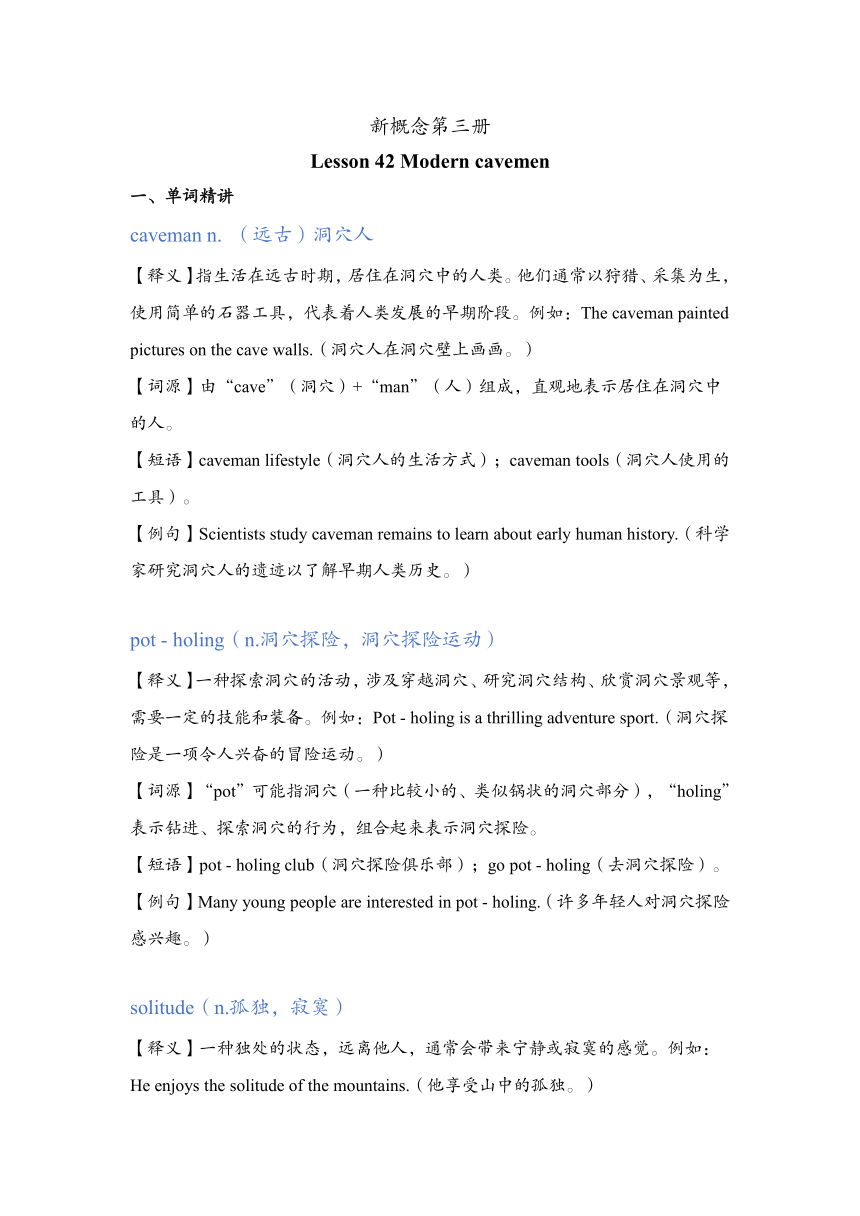
|
|
| 格式 | docx | ||
| 文件大小 | 403.4KB | ||
| 资源类型 | 教案 | ||
| 版本资源 | 新概念英语 | ||
| 科目 | 英语 | ||
| 更新时间 | 2024-12-05 00:00:00 | ||
图片预览

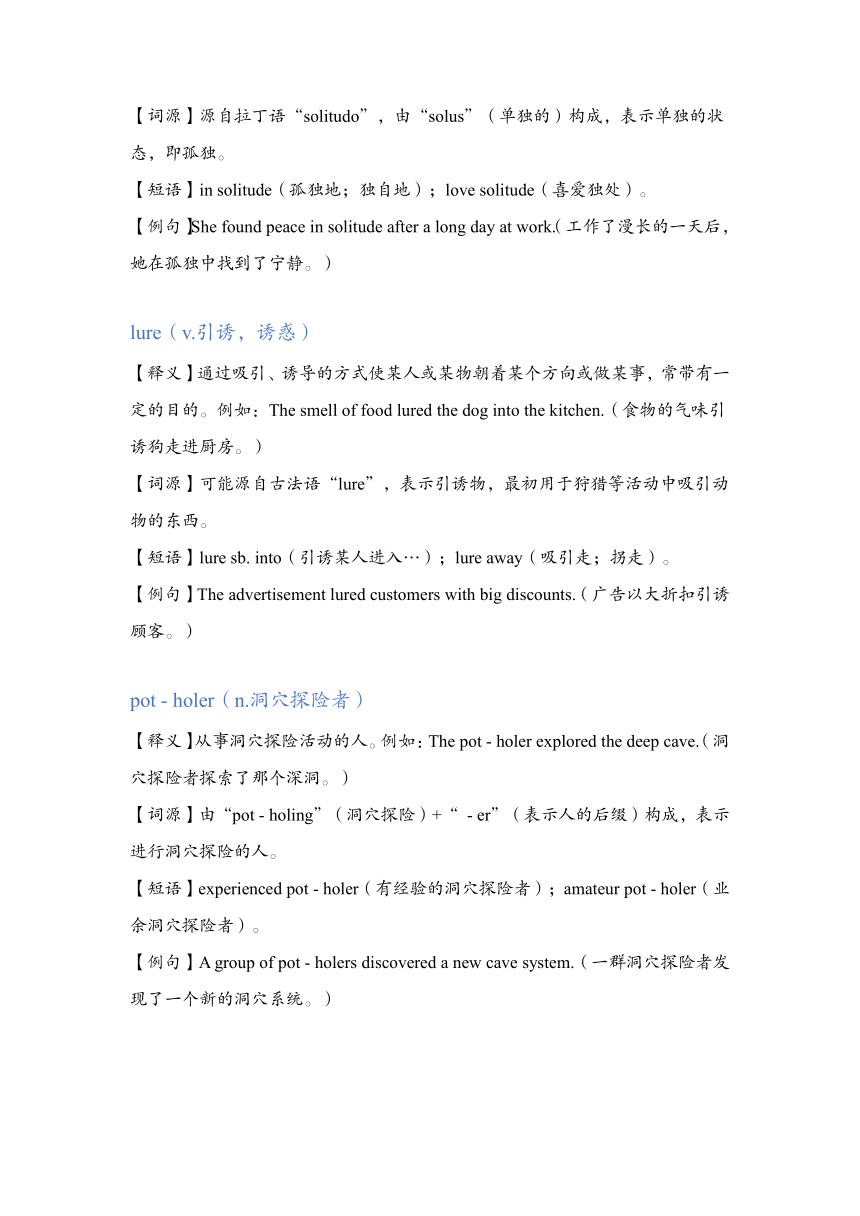
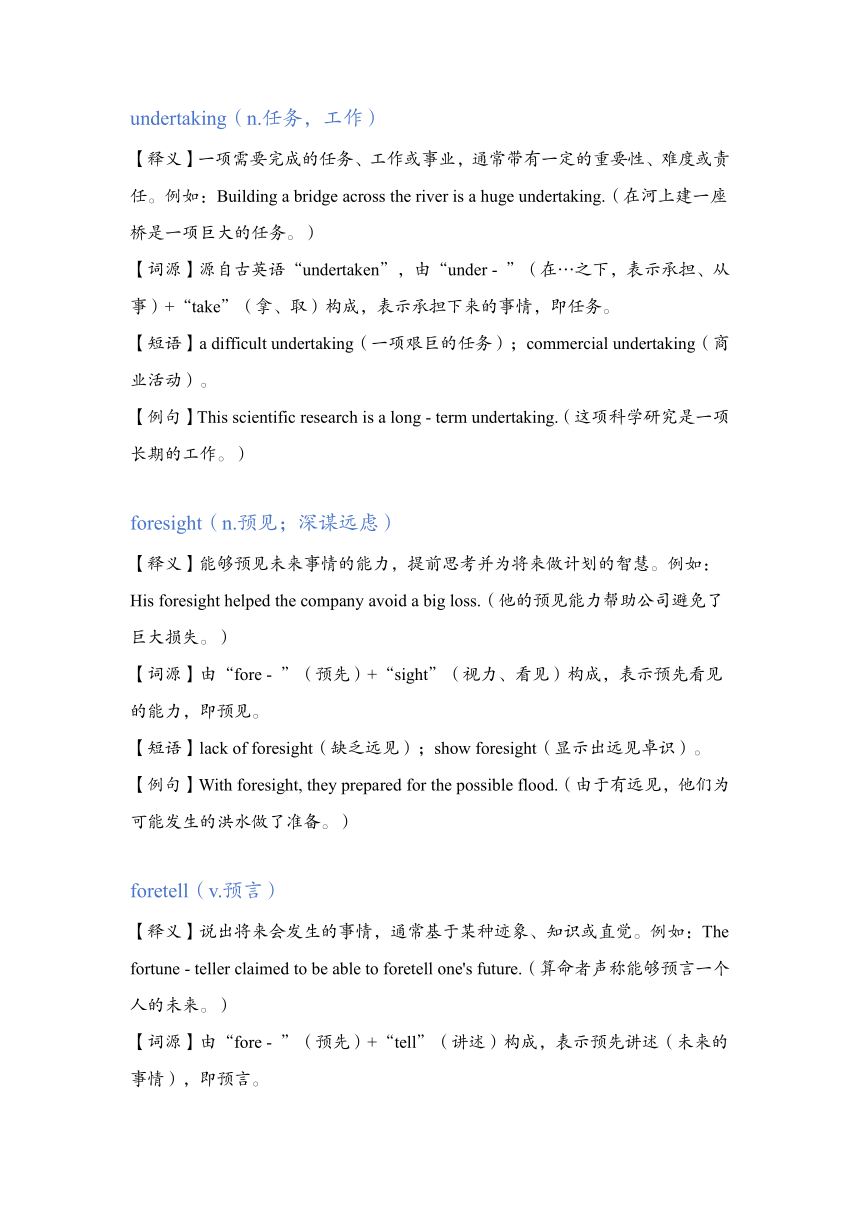
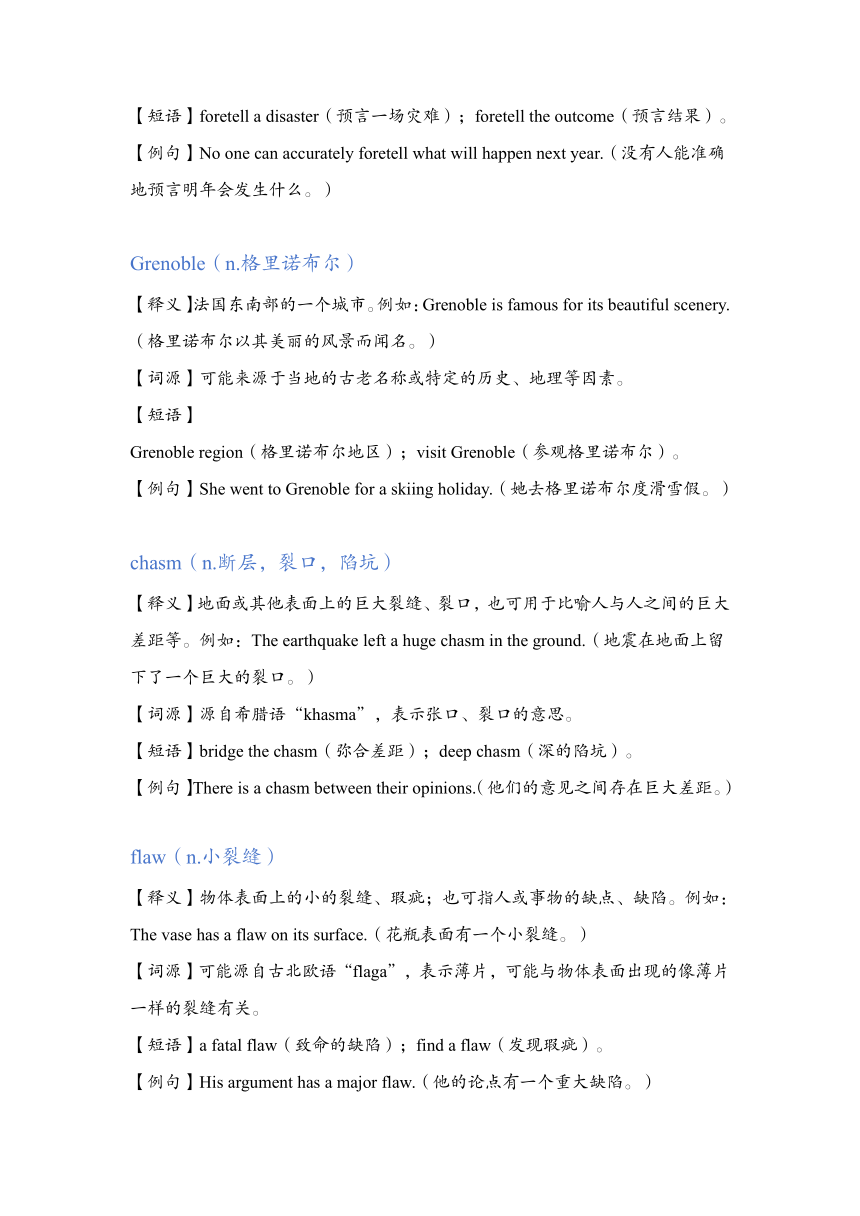
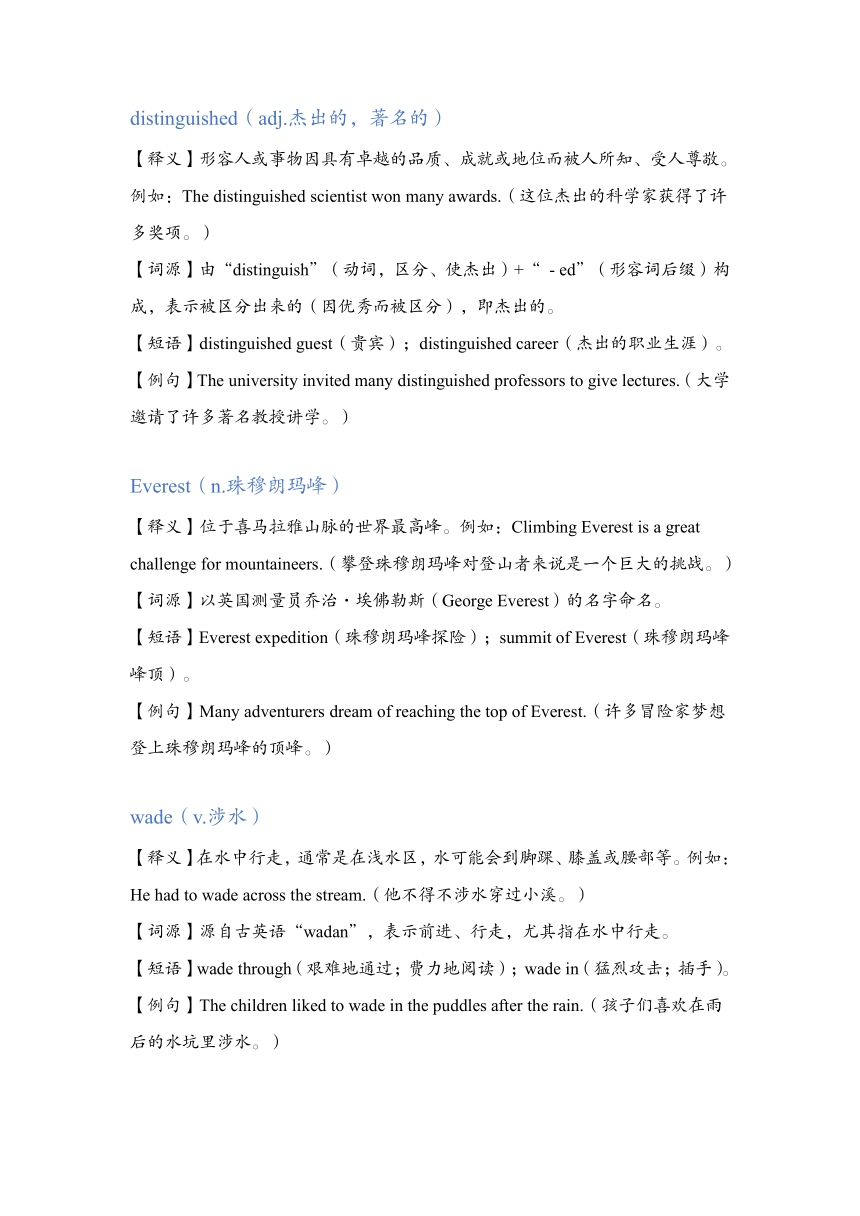
文档简介
新概念第三册
Lesson 42 Modern cavemen
单词精讲
caveman n. (远古)洞穴人
【释义】指生活在远古时期,居住在洞穴中的人类。他们通常以狩猎、采集为生,使用简单的石器工具,代表着人类发展的早期阶段。例如:The caveman painted pictures on the cave walls.(洞穴人在洞穴壁上画画。)
【词源】由“cave”(洞穴)+“man”(人)组成,直观地表示居住在洞穴中的人。
【短语】caveman lifestyle(洞穴人的生活方式);caveman tools(洞穴人使用的工具)。
【例句】Scientists study caveman remains to learn about early human history.(科学家研究洞穴人的遗迹以了解早期人类历史。)
pot - holing(n.洞穴探险,洞穴探险运动)
【释义】一种探索洞穴的活动,涉及穿越洞穴、研究洞穴结构、欣赏洞穴景观等,需要一定的技能和装备。例如:Pot - holing is a thrilling adventure sport.(洞穴探险是一项令人兴奋的冒险运动。)
【词源】“pot”可能指洞穴(一种比较小的、类似锅状的洞穴部分),“holing”表示钻进、探索洞穴的行为,组合起来表示洞穴探险。
【短语】pot - holing club(洞穴探险俱乐部);go pot - holing(去洞穴探险)。
【例句】Many young people are interested in pot - holing.(许多年轻人对洞穴探险感兴趣。)
solitude(n.孤独,寂寞)
【释义】一种独处的状态,远离他人,通常会带来宁静或寂寞的感觉。例如:He enjoys the solitude of the mountains.(他享受山中的孤独。)
【词源】源自拉丁语“solitudo”,由“solus”(单独的)构成,表示单独的状态,即孤独。
【短语】in solitude(孤独地;独自地);love solitude(喜爱独处)。
【例句】She found peace in solitude after a long day at work.(工作了漫长的一天后,她在孤独中找到了宁静。)
lure(v.引诱,诱惑)
【释义】通过吸引、诱导的方式使某人或某物朝着某个方向或做某事,常带有一定的目的。例如:The smell of food lured the dog into the kitchen.(食物的气味引诱狗走进厨房。)
【词源】可能源自古法语“lure”,表示引诱物,最初用于狩猎等活动中吸引动物的东西。
【短语】lure sb. into(引诱某人进入…);lure away(吸引走;拐走)。
【例句】The advertisement lured customers with big discounts.(广告以大折扣引诱顾客。)
pot - holer(n.洞穴探险者)
【释义】从事洞穴探险活动的人。例如:The pot - holer explored the deep cave.(洞穴探险者探索了那个深洞。)
【词源】由“pot - holing”(洞穴探险)+“ - er”(表示人的后缀)构成,表示进行洞穴探险的人。
【短语】experienced pot - holer(有经验的洞穴探险者);amateur pot - holer(业余洞穴探险者)。
【例句】A group of pot - holers discovered a new cave system.(一群洞穴探险者发现了一个新的洞穴系统。)
undertaking(n.任务,工作)
【释义】一项需要完成的任务、工作或事业,通常带有一定的重要性、难度或责任。例如:Building a bridge across the river is a huge undertaking.(在河上建一座桥是一项巨大的任务。)
【词源】源自古英语“undertaken”,由“under - ”(在…之下,表示承担、从事)+“take”(拿、取)构成,表示承担下来的事情,即任务。
【短语】a difficult undertaking(一项艰巨的任务);commercial undertaking(商业活动)。
【例句】This scientific research is a long - term undertaking.(这项科学研究是一项长期的工作。)
foresight(n.预见;深谋远虑)
【释义】能够预见未来事情的能力,提前思考并为将来做计划的智慧。例如:His foresight helped the company avoid a big loss.(他的预见能力帮助公司避免了巨大损失。)
【词源】由“fore - ”(预先)+“sight”(视力、看见)构成,表示预先看见的能力,即预见。
【短语】lack of foresight(缺乏远见);show foresight(显示出远见卓识)。
【例句】With foresight, they prepared for the possible flood.(由于有远见,他们为可能发生的洪水做了准备。)
foretell(v.预言)
【释义】说出将来会发生的事情,通常基于某种迹象、知识或直觉。例如:The fortune - teller claimed to be able to foretell one's future.(算命者声称能够预言一个人的未来。)
【词源】由“fore - ”(预先)+“tell”(讲述)构成,表示预先讲述(未来的事情),即预言。
【短语】foretell a disaster(预言一场灾难);foretell the outcome(预言结果)。
【例句】No one can accurately foretell what will happen next year.(没有人能准确地预言明年会发生什么。)
Grenoble(n.格里诺布尔)
【释义】法国东南部的一个城市。例如:Grenoble is famous for its beautiful scenery.(格里诺布尔以其美丽的风景而闻名。)
【词源】可能来源于当地的古老名称或特定的历史、地理等因素。
【短语】
Grenoble region(格里诺布尔地区);visit Grenoble(参观格里诺布尔)。
【例句】She went to Grenoble for a skiing holiday.(她去格里诺布尔度滑雪假。)
chasm(n.断层,裂口,陷坑)
【释义】地面或其他表面上的巨大裂缝、裂口,也可用于比喻人与人之间的巨大差距等。例如:The earthquake left a huge chasm in the ground.(地震在地面上留下了一个巨大的裂口。)
【词源】源自希腊语“khasma”,表示张口、裂口的意思。
【短语】bridge the chasm(弥合差距);deep chasm(深的陷坑)。
【例句】There is a chasm between their opinions.(他们的意见之间存在巨大差距。)
flaw(n.小裂缝)
【释义】物体表面上的小的裂缝、瑕疵;也可指人或事物的缺点、缺陷。例如:The vase has a flaw on its surface.(花瓶表面有一个小裂缝。)
【词源】可能源自古北欧语“flaga”,表示薄片,可能与物体表面出现的像薄片一样的裂缝有关。
【短语】a fatal flaw(致命的缺陷);find a flaw(发现瑕疵)。
【例句】His argument has a major flaw.(他的论点有一个重大缺陷。)
distinguished(adj.杰出的,著名的)
【释义】形容人或事物因具有卓越的品质、成就或地位而被人所知、受人尊敬。例如:The distinguished scientist won many awards.(这位杰出的科学家获得了许多奖项。)
【词源】由“distinguish”(动词,区分、使杰出)+“ - ed”(形容词后缀)构成,表示被区分出来的(因优秀而被区分),即杰出的。
【短语】distinguished guest(贵宾);distinguished career(杰出的职业生涯)。
【例句】The university invited many distinguished professors to give lectures.(大学邀请了许多著名教授讲学。)
Everest(n.珠穆朗玛峰)
【释义】位于喜马拉雅山脉的世界最高峰。例如:Climbing Everest is a great challenge for mountaineers.(攀登珠穆朗玛峰对登山者来说是一个巨大的挑战。)
【词源】以英国测量员乔治·埃佛勒斯(George Everest)的名字命名。
【短语】Everest expedition(珠穆朗玛峰探险);summit of Everest(珠穆朗玛峰峰顶)。
【例句】Many adventurers dream of reaching the top of Everest.(许多冒险家梦想登上珠穆朗玛峰的顶峰。)
wade(v.涉水)
【释义】在水中行走,通常是在浅水区,水可能会到脚踝、膝盖或腰部等。例如:He had to wade across the stream.(他不得不涉水穿过小溪。)
【词源】源自古英语“wadan”,表示前进、行走,尤其指在水中行走。
【短语】wade through(艰难地通过;费力地阅读);wade in(猛烈攻击;插手)。
【例句】The children liked to wade in the puddles after the rain.(孩子们喜欢在雨后的水坑里涉水。)
waterfall(n.瀑布)
【释义】河流从高处垂直落下形成的自然景观,水从上方快速流下。例如:The waterfall is a very beautiful sight.(瀑布是非常美丽的景观。)
【词源】由“water”(水)+“fall”(落下)组成,表示水落下的地方,即瀑布。
【短语】Niagara Falls is a famous waterfall.(尼亚加拉大瀑布是一个著名的瀑布。);big waterfall(大瀑布)。
【例句】They took pictures in front of the waterfall.(他们在瀑布前拍照。)
gear(n.一套用具)
【释义】一组相关的工具、设备或零件,用于特定的目的或活动。例如:A camping gear includes a tent, sleeping bag and cooking utensils.(一套露营用具包括帐篷、睡袋和炊具。)
【词源】可能源自古英语“gerwan”,表示装备、准备,名词形式表示用于装备的东西,即一套用具。
【短语】fishing gear(渔具);climbing gear(登山装备)。
【例句】He checked his climbing gear before starting the ascent.(他在开始攀登前检查了他的登山装备。)
inflatable(adj.可充气的)
【释义】能够被充气的,通常指物体(如气球、床垫等)可以通过充入气体而膨胀起来。例如:An inflatable boat is very convenient for traveling on water.(可充气的船在水上旅行非常方便。)
【词源】由“inflate”(动词,充气、使膨胀)+“ - able”(能够…的后缀)构成,表示能够充气的。
【短语】inflatable mattress(充气床垫);inflatable toy(充气玩具)。
【例句】The inflatable pool is easy to set up in the backyard.(可充气的游泳池在后院很容易搭建。)
rubble(n.碎瓦)
【释义】破碎的石头、砖块或瓦片等建筑材料的碎片,通常是建筑物倒塌或被破坏后产生的。例如:After the earthquake, there was a lot of rubble everywhere.(地震后,到处都是碎瓦。)
【词源】可能源自古法语“roble”,表示碎石、碎块的意思。
【短语】rubble pile(碎石堆);clear the rubble(清理碎瓦)。
【例句】Workers were busy removing the rubble from the construction site.(工人们正忙于从建筑工地上清除碎瓦。)
insistent(adj.连续的,不断的)
【释义】持续不断地坚持、强调某事,常指声音、要求等的持续。例如:His insistent knocking on the door made me open it.(他不断的敲门声使我开了门。)
【词源】由“insist”(动词,坚持)+“ - ent”(形容词后缀)构成,表示坚持的、不断的。
【短语】insistent demand(持续的要求);insistent noise(连续的噪音)。
【例句】The insistent ringing of the phone woke me up.(电话持续的铃声把我吵醒了。)
boom(v.轰响)
【释义】发出低沉、大声的轰鸣或回响,通常是由于爆炸、重物撞击或强大的气流等引起的。例如:The thunder boomed in the sky.(雷声在天空中轰响。)
【词源】可能是拟声词,模仿低沉的轰鸣声而创造的词。
【短语】boom out(以低沉的声音说出);boom of cannon(大炮的轰鸣声)。
【例句】The fireworks boomed over the city.(烟花在城市上空轰响。)
waterspout(n.强大的水柱)
【释义】一种在水面上形成的强烈旋转的水柱,通常与龙卷风有关,形状像一个巨大的、向上喷水的管道。例如:The waterspout was a spectacular sight on the ocean.(强大的水柱在海洋上是一种壮观的景象。)
【词源】由“water”(水)+“spout”(喷口、喷出)组成,表示喷出的水柱。
【短语】a huge waterspout(一个巨大的强大水柱);waterspout formation(强大水柱的形成)。
【例句】Sailors were afraid of the waterspout during the storm.(水手们在暴风雨期间害怕强大的水柱。)
cleft(n.裂隙,开口)
【释义】物体表面或地面上的裂缝、开口,比“chasm”小,但也表示一种分裂或断开的地方。例如:The tree had a cleft in its trunk.(树干上有一个裂隙。)
【词源】源自古英语“cleoft”,表示劈开、分裂的结果,即裂隙。
【短语】a narrow cleft(狭窄的裂隙);cleft in the rock(岩石中的裂隙)。
【例句】A small animal hid in the cleft of the wall.(一只小动物藏在墙的裂隙里。)
cavern(n.洞穴)
【释义】一种较大的、天然形成的地下洞穴,通常有较大的空间,可以容纳人或动物。例如:The cavern was filled with stalactites and stalagmites.(洞穴里满是钟乳石和石笋。)
【词源】源自拉丁语“caverna”,表示洞穴的意思。
【短语】explore the cavern(探索洞穴);deep cavern(深洞穴)。
【例句】They discovered a new cavern during their expedition.(他们在探险期间发现了一个新的洞穴。)
stalagmite(n.石笋)
【释义】一种在洞穴底部向上生长的圆锥形或柱形的碳酸钙沉积物,由洞顶滴下的水滴中的碳酸钙逐渐堆积而成。例如:The stalagmite in the cave was very tall.(洞穴里的石笋很高。)
【词源】源自希腊语“stalagma”,表示滴下、落下的东西(因为是水滴落下形成的)。
【短语】stalagmite formation(石笋的形成);tall stalagmite(高石笋)。
【例句】It takes a long time for a stalagmite to grow.(石笋的生长需要很长时间。)
stalactite(n.钟乳石)
【释义】一种从洞穴顶部向下垂悬的圆锥形或柱形的碳酸钙沉积物,由含有碳酸钙的水滴从洞顶渗出并逐渐堆积而成。例如:The stalactite looked like an icicle.(钟乳石看起来像冰柱。)
【词源】源自希腊语“stalaktos”,表示滴下的(与stalagmite相对应,一个从上往下滴形成,一个从下往上堆积)。
【短语】stalactite ceiling(钟乳石天花板);beautiful stalactite(美丽的钟乳石)。
【例句】The light shone on the stalactite, making it sparkle.(光线照在钟乳石上,使它闪闪发光。)
limestone n.石灰石
【释义】一种主要由碳酸钙组成的沉积岩,颜色多样,质地较硬,在建筑、工业等领域有广泛应用。例如:Limestone is often used in the construction of buildings.(石灰石常被用于建筑施工。)
【词源】“lime”(石灰)+“stone”(石头),这种岩石可用于烧制石灰,所以得名。
【短语】limestone quarry(石灰石采石场);limestone cave(石灰石洞穴)。
【例句】The ancient castle was built with limestone.(这座古老的城堡是用石灰石建造的。)
glisten(v.闪烁)
【释义】指因表面湿润、有光泽或反光而闪耀微光。例如:The dew - covered grass glistened in the morning sun.(被露水覆盖的草在晨光下闪烁。)
【词源】可能源自古英语或其他日耳曼语族语言,与发光、闪耀的概念相关。
【短语】glisten with(因…而闪烁)。
【例句】Her eyes glistened with tears.(她的眼睛闪烁着泪光。)
eerie(adj.引起恐惧的,可怕的)
【释义】给人一种怪异、阴森、恐怖的感觉,常与超自然或神秘的事物有关。例如:The old abandoned house had an eerie silence.(那座废弃的老房子有一种可怕的寂静。)
【词源】可能源自苏格兰语,最初表示“害怕的”,逐渐演变为形容事物令人恐惧。
【短语】eerie atmosphere(恐怖的氛围);eerie feeling(怪异的感觉)。
【例句】The mist - covered forest at night had an eerie look.(夜晚被雾笼罩的森林看起来很可怕。)
dome(n.穹窿,圆顶)
【释义】一种半球形或拱形的结构,常见于建筑顶部,可提供较大的内部空间。例如:The cathedral has a magnificent dome.(大教堂有一个宏伟的穹顶。)
【词源】源自拉丁语“domus”(房屋),表示一种像房屋顶部的圆形结构。
【短语】dome - shaped(穹顶状的);dome of the sky(苍穹)。
【例句】The observatory has a large dome for the telescope.(天文台有一个用于放置望远镜的大圆顶。)
二、课文精讲
1.Cave exploration, or potholing, as it has come to be known, is a relatively new sport.洞穴勘查—或洞穴勘探—是一项比较新的体育活动。
as it has come to be known是固定搭配,作插入语。
2.Perhaps it is the desire for solitude or the chance of making an unexpected discovery that lures men down to the depths of the earth.寻求独处的愿望或寻求意外发现的机会的欲望吸引人们来到地下深处。
这是一个强调句。
3.It is impossible to give a satisfactory explanation for a pot-holer's motives.要想对洞穴探险者的动机作出满意的解释是不可能的。
句子的主体结构是it is impossible to give an explanation for sth.意思是“为某事给出一个解释是不可能的”。
4.For him, caves have the same peculiar fascination which high mountains have for the climber.对洞穴探险者来说,洞穴有一种特殊的魅力,就像高山对登山者有特殊魅力一样。
have fascination的意思是“具有吸引力”。
5.Exploring really deep caves is not a task for the Sunday afternoon rambler.探测非常深的洞穴不是那些在星期日下午漫步的人所能胜任的。
afternoon rambler的意思是“下午的漫步者”,为含蓄陈述修辞格。
6.It can take as long as eight days to rig up rope ladders and to establish supply bases before a descent can be made into a very deep cave.有时需要花费整整 8天时间来搭起绳梯,建立供应基地,然后才能到一个很深的洞穴里。
句子的主体结构是it can take+(time)to do sth,意思是“需要花多长时间去做某事”。
7.Precautions of this sort are necessary, for it is impossible to foretell the exact nature of the difficulties which will confront the potholer.作出这样的准备是必要的,因为无法预见到洞穴探险者究竟会遇到什么性质的困难。
sth.be necessary的意思是“做某事是有必要的”。
8.As it is only six feet across, it is barely noticeable.仅6英尺宽,很难被发现。
as引导原因状语从句,交代“很难被发现”的原因。
9. The cave might never have been discovered had not the entrance been spotted by the distinguished French potholer, Berger.若不是法国著名洞穴探险家伯杰由于偶然的机会发现了这个洞口的话,这个洞也许不会为人所知。
这是一个省略了if的虚拟语气的句子,采用了倒装形式。
本句还原:If the entrance had not been spotted by the distinguished French pot—holer,Berger,the cave might never have been discovered.
10. Since its discovery, it has become a sort of potholers' Everest.自从被发现以后,这个洞成了洞穴探险者的珠穆朗玛峰。
potholers’Everest为暗喻修辞格。
11. After entering the narrow gap on the plateau, they climbed down the steep sides of the cave until they came to a narrow corridor.他们从高原上的窄缝进去,顺着笔直陡峭的洞壁往下爬。来到一条狭窄的走廊上。
after+动词的现在分词形式构成时间状语。
12.To protect themselves from the icy water, they had to wear special rubber suits. 湖水冰冷刺骨,他们必须穿上一种特制的橡皮服以保护自己。
icy water表示“冰水”。
13.Squeezing through a cleft in the rocks, the potholers arrived at an enormous cavern, the size of a huge concert hall.洞穴探险者从岩石缝里挤身过去,来到一个巨大的洞里,其大小相当于一个音乐厅。
the size of a huge concert hall是cavern的同位语。
14.Round about, piles of lime-stone glistened in all the colours of the rainbow.周围是一堆堆石灰石,像彩虹一样闪闪发光。
glisten表示“闪烁”。
Lesson 42 Modern cavemen
单词精讲
caveman n. (远古)洞穴人
【释义】指生活在远古时期,居住在洞穴中的人类。他们通常以狩猎、采集为生,使用简单的石器工具,代表着人类发展的早期阶段。例如:The caveman painted pictures on the cave walls.(洞穴人在洞穴壁上画画。)
【词源】由“cave”(洞穴)+“man”(人)组成,直观地表示居住在洞穴中的人。
【短语】caveman lifestyle(洞穴人的生活方式);caveman tools(洞穴人使用的工具)。
【例句】Scientists study caveman remains to learn about early human history.(科学家研究洞穴人的遗迹以了解早期人类历史。)
pot - holing(n.洞穴探险,洞穴探险运动)
【释义】一种探索洞穴的活动,涉及穿越洞穴、研究洞穴结构、欣赏洞穴景观等,需要一定的技能和装备。例如:Pot - holing is a thrilling adventure sport.(洞穴探险是一项令人兴奋的冒险运动。)
【词源】“pot”可能指洞穴(一种比较小的、类似锅状的洞穴部分),“holing”表示钻进、探索洞穴的行为,组合起来表示洞穴探险。
【短语】pot - holing club(洞穴探险俱乐部);go pot - holing(去洞穴探险)。
【例句】Many young people are interested in pot - holing.(许多年轻人对洞穴探险感兴趣。)
solitude(n.孤独,寂寞)
【释义】一种独处的状态,远离他人,通常会带来宁静或寂寞的感觉。例如:He enjoys the solitude of the mountains.(他享受山中的孤独。)
【词源】源自拉丁语“solitudo”,由“solus”(单独的)构成,表示单独的状态,即孤独。
【短语】in solitude(孤独地;独自地);love solitude(喜爱独处)。
【例句】She found peace in solitude after a long day at work.(工作了漫长的一天后,她在孤独中找到了宁静。)
lure(v.引诱,诱惑)
【释义】通过吸引、诱导的方式使某人或某物朝着某个方向或做某事,常带有一定的目的。例如:The smell of food lured the dog into the kitchen.(食物的气味引诱狗走进厨房。)
【词源】可能源自古法语“lure”,表示引诱物,最初用于狩猎等活动中吸引动物的东西。
【短语】lure sb. into(引诱某人进入…);lure away(吸引走;拐走)。
【例句】The advertisement lured customers with big discounts.(广告以大折扣引诱顾客。)
pot - holer(n.洞穴探险者)
【释义】从事洞穴探险活动的人。例如:The pot - holer explored the deep cave.(洞穴探险者探索了那个深洞。)
【词源】由“pot - holing”(洞穴探险)+“ - er”(表示人的后缀)构成,表示进行洞穴探险的人。
【短语】experienced pot - holer(有经验的洞穴探险者);amateur pot - holer(业余洞穴探险者)。
【例句】A group of pot - holers discovered a new cave system.(一群洞穴探险者发现了一个新的洞穴系统。)
undertaking(n.任务,工作)
【释义】一项需要完成的任务、工作或事业,通常带有一定的重要性、难度或责任。例如:Building a bridge across the river is a huge undertaking.(在河上建一座桥是一项巨大的任务。)
【词源】源自古英语“undertaken”,由“under - ”(在…之下,表示承担、从事)+“take”(拿、取)构成,表示承担下来的事情,即任务。
【短语】a difficult undertaking(一项艰巨的任务);commercial undertaking(商业活动)。
【例句】This scientific research is a long - term undertaking.(这项科学研究是一项长期的工作。)
foresight(n.预见;深谋远虑)
【释义】能够预见未来事情的能力,提前思考并为将来做计划的智慧。例如:His foresight helped the company avoid a big loss.(他的预见能力帮助公司避免了巨大损失。)
【词源】由“fore - ”(预先)+“sight”(视力、看见)构成,表示预先看见的能力,即预见。
【短语】lack of foresight(缺乏远见);show foresight(显示出远见卓识)。
【例句】With foresight, they prepared for the possible flood.(由于有远见,他们为可能发生的洪水做了准备。)
foretell(v.预言)
【释义】说出将来会发生的事情,通常基于某种迹象、知识或直觉。例如:The fortune - teller claimed to be able to foretell one's future.(算命者声称能够预言一个人的未来。)
【词源】由“fore - ”(预先)+“tell”(讲述)构成,表示预先讲述(未来的事情),即预言。
【短语】foretell a disaster(预言一场灾难);foretell the outcome(预言结果)。
【例句】No one can accurately foretell what will happen next year.(没有人能准确地预言明年会发生什么。)
Grenoble(n.格里诺布尔)
【释义】法国东南部的一个城市。例如:Grenoble is famous for its beautiful scenery.(格里诺布尔以其美丽的风景而闻名。)
【词源】可能来源于当地的古老名称或特定的历史、地理等因素。
【短语】
Grenoble region(格里诺布尔地区);visit Grenoble(参观格里诺布尔)。
【例句】She went to Grenoble for a skiing holiday.(她去格里诺布尔度滑雪假。)
chasm(n.断层,裂口,陷坑)
【释义】地面或其他表面上的巨大裂缝、裂口,也可用于比喻人与人之间的巨大差距等。例如:The earthquake left a huge chasm in the ground.(地震在地面上留下了一个巨大的裂口。)
【词源】源自希腊语“khasma”,表示张口、裂口的意思。
【短语】bridge the chasm(弥合差距);deep chasm(深的陷坑)。
【例句】There is a chasm between their opinions.(他们的意见之间存在巨大差距。)
flaw(n.小裂缝)
【释义】物体表面上的小的裂缝、瑕疵;也可指人或事物的缺点、缺陷。例如:The vase has a flaw on its surface.(花瓶表面有一个小裂缝。)
【词源】可能源自古北欧语“flaga”,表示薄片,可能与物体表面出现的像薄片一样的裂缝有关。
【短语】a fatal flaw(致命的缺陷);find a flaw(发现瑕疵)。
【例句】His argument has a major flaw.(他的论点有一个重大缺陷。)
distinguished(adj.杰出的,著名的)
【释义】形容人或事物因具有卓越的品质、成就或地位而被人所知、受人尊敬。例如:The distinguished scientist won many awards.(这位杰出的科学家获得了许多奖项。)
【词源】由“distinguish”(动词,区分、使杰出)+“ - ed”(形容词后缀)构成,表示被区分出来的(因优秀而被区分),即杰出的。
【短语】distinguished guest(贵宾);distinguished career(杰出的职业生涯)。
【例句】The university invited many distinguished professors to give lectures.(大学邀请了许多著名教授讲学。)
Everest(n.珠穆朗玛峰)
【释义】位于喜马拉雅山脉的世界最高峰。例如:Climbing Everest is a great challenge for mountaineers.(攀登珠穆朗玛峰对登山者来说是一个巨大的挑战。)
【词源】以英国测量员乔治·埃佛勒斯(George Everest)的名字命名。
【短语】Everest expedition(珠穆朗玛峰探险);summit of Everest(珠穆朗玛峰峰顶)。
【例句】Many adventurers dream of reaching the top of Everest.(许多冒险家梦想登上珠穆朗玛峰的顶峰。)
wade(v.涉水)
【释义】在水中行走,通常是在浅水区,水可能会到脚踝、膝盖或腰部等。例如:He had to wade across the stream.(他不得不涉水穿过小溪。)
【词源】源自古英语“wadan”,表示前进、行走,尤其指在水中行走。
【短语】wade through(艰难地通过;费力地阅读);wade in(猛烈攻击;插手)。
【例句】The children liked to wade in the puddles after the rain.(孩子们喜欢在雨后的水坑里涉水。)
waterfall(n.瀑布)
【释义】河流从高处垂直落下形成的自然景观,水从上方快速流下。例如:The waterfall is a very beautiful sight.(瀑布是非常美丽的景观。)
【词源】由“water”(水)+“fall”(落下)组成,表示水落下的地方,即瀑布。
【短语】Niagara Falls is a famous waterfall.(尼亚加拉大瀑布是一个著名的瀑布。);big waterfall(大瀑布)。
【例句】They took pictures in front of the waterfall.(他们在瀑布前拍照。)
gear(n.一套用具)
【释义】一组相关的工具、设备或零件,用于特定的目的或活动。例如:A camping gear includes a tent, sleeping bag and cooking utensils.(一套露营用具包括帐篷、睡袋和炊具。)
【词源】可能源自古英语“gerwan”,表示装备、准备,名词形式表示用于装备的东西,即一套用具。
【短语】fishing gear(渔具);climbing gear(登山装备)。
【例句】He checked his climbing gear before starting the ascent.(他在开始攀登前检查了他的登山装备。)
inflatable(adj.可充气的)
【释义】能够被充气的,通常指物体(如气球、床垫等)可以通过充入气体而膨胀起来。例如:An inflatable boat is very convenient for traveling on water.(可充气的船在水上旅行非常方便。)
【词源】由“inflate”(动词,充气、使膨胀)+“ - able”(能够…的后缀)构成,表示能够充气的。
【短语】inflatable mattress(充气床垫);inflatable toy(充气玩具)。
【例句】The inflatable pool is easy to set up in the backyard.(可充气的游泳池在后院很容易搭建。)
rubble(n.碎瓦)
【释义】破碎的石头、砖块或瓦片等建筑材料的碎片,通常是建筑物倒塌或被破坏后产生的。例如:After the earthquake, there was a lot of rubble everywhere.(地震后,到处都是碎瓦。)
【词源】可能源自古法语“roble”,表示碎石、碎块的意思。
【短语】rubble pile(碎石堆);clear the rubble(清理碎瓦)。
【例句】Workers were busy removing the rubble from the construction site.(工人们正忙于从建筑工地上清除碎瓦。)
insistent(adj.连续的,不断的)
【释义】持续不断地坚持、强调某事,常指声音、要求等的持续。例如:His insistent knocking on the door made me open it.(他不断的敲门声使我开了门。)
【词源】由“insist”(动词,坚持)+“ - ent”(形容词后缀)构成,表示坚持的、不断的。
【短语】insistent demand(持续的要求);insistent noise(连续的噪音)。
【例句】The insistent ringing of the phone woke me up.(电话持续的铃声把我吵醒了。)
boom(v.轰响)
【释义】发出低沉、大声的轰鸣或回响,通常是由于爆炸、重物撞击或强大的气流等引起的。例如:The thunder boomed in the sky.(雷声在天空中轰响。)
【词源】可能是拟声词,模仿低沉的轰鸣声而创造的词。
【短语】boom out(以低沉的声音说出);boom of cannon(大炮的轰鸣声)。
【例句】The fireworks boomed over the city.(烟花在城市上空轰响。)
waterspout(n.强大的水柱)
【释义】一种在水面上形成的强烈旋转的水柱,通常与龙卷风有关,形状像一个巨大的、向上喷水的管道。例如:The waterspout was a spectacular sight on the ocean.(强大的水柱在海洋上是一种壮观的景象。)
【词源】由“water”(水)+“spout”(喷口、喷出)组成,表示喷出的水柱。
【短语】a huge waterspout(一个巨大的强大水柱);waterspout formation(强大水柱的形成)。
【例句】Sailors were afraid of the waterspout during the storm.(水手们在暴风雨期间害怕强大的水柱。)
cleft(n.裂隙,开口)
【释义】物体表面或地面上的裂缝、开口,比“chasm”小,但也表示一种分裂或断开的地方。例如:The tree had a cleft in its trunk.(树干上有一个裂隙。)
【词源】源自古英语“cleoft”,表示劈开、分裂的结果,即裂隙。
【短语】a narrow cleft(狭窄的裂隙);cleft in the rock(岩石中的裂隙)。
【例句】A small animal hid in the cleft of the wall.(一只小动物藏在墙的裂隙里。)
cavern(n.洞穴)
【释义】一种较大的、天然形成的地下洞穴,通常有较大的空间,可以容纳人或动物。例如:The cavern was filled with stalactites and stalagmites.(洞穴里满是钟乳石和石笋。)
【词源】源自拉丁语“caverna”,表示洞穴的意思。
【短语】explore the cavern(探索洞穴);deep cavern(深洞穴)。
【例句】They discovered a new cavern during their expedition.(他们在探险期间发现了一个新的洞穴。)
stalagmite(n.石笋)
【释义】一种在洞穴底部向上生长的圆锥形或柱形的碳酸钙沉积物,由洞顶滴下的水滴中的碳酸钙逐渐堆积而成。例如:The stalagmite in the cave was very tall.(洞穴里的石笋很高。)
【词源】源自希腊语“stalagma”,表示滴下、落下的东西(因为是水滴落下形成的)。
【短语】stalagmite formation(石笋的形成);tall stalagmite(高石笋)。
【例句】It takes a long time for a stalagmite to grow.(石笋的生长需要很长时间。)
stalactite(n.钟乳石)
【释义】一种从洞穴顶部向下垂悬的圆锥形或柱形的碳酸钙沉积物,由含有碳酸钙的水滴从洞顶渗出并逐渐堆积而成。例如:The stalactite looked like an icicle.(钟乳石看起来像冰柱。)
【词源】源自希腊语“stalaktos”,表示滴下的(与stalagmite相对应,一个从上往下滴形成,一个从下往上堆积)。
【短语】stalactite ceiling(钟乳石天花板);beautiful stalactite(美丽的钟乳石)。
【例句】The light shone on the stalactite, making it sparkle.(光线照在钟乳石上,使它闪闪发光。)
limestone n.石灰石
【释义】一种主要由碳酸钙组成的沉积岩,颜色多样,质地较硬,在建筑、工业等领域有广泛应用。例如:Limestone is often used in the construction of buildings.(石灰石常被用于建筑施工。)
【词源】“lime”(石灰)+“stone”(石头),这种岩石可用于烧制石灰,所以得名。
【短语】limestone quarry(石灰石采石场);limestone cave(石灰石洞穴)。
【例句】The ancient castle was built with limestone.(这座古老的城堡是用石灰石建造的。)
glisten(v.闪烁)
【释义】指因表面湿润、有光泽或反光而闪耀微光。例如:The dew - covered grass glistened in the morning sun.(被露水覆盖的草在晨光下闪烁。)
【词源】可能源自古英语或其他日耳曼语族语言,与发光、闪耀的概念相关。
【短语】glisten with(因…而闪烁)。
【例句】Her eyes glistened with tears.(她的眼睛闪烁着泪光。)
eerie(adj.引起恐惧的,可怕的)
【释义】给人一种怪异、阴森、恐怖的感觉,常与超自然或神秘的事物有关。例如:The old abandoned house had an eerie silence.(那座废弃的老房子有一种可怕的寂静。)
【词源】可能源自苏格兰语,最初表示“害怕的”,逐渐演变为形容事物令人恐惧。
【短语】eerie atmosphere(恐怖的氛围);eerie feeling(怪异的感觉)。
【例句】The mist - covered forest at night had an eerie look.(夜晚被雾笼罩的森林看起来很可怕。)
dome(n.穹窿,圆顶)
【释义】一种半球形或拱形的结构,常见于建筑顶部,可提供较大的内部空间。例如:The cathedral has a magnificent dome.(大教堂有一个宏伟的穹顶。)
【词源】源自拉丁语“domus”(房屋),表示一种像房屋顶部的圆形结构。
【短语】dome - shaped(穹顶状的);dome of the sky(苍穹)。
【例句】The observatory has a large dome for the telescope.(天文台有一个用于放置望远镜的大圆顶。)
二、课文精讲
1.Cave exploration, or potholing, as it has come to be known, is a relatively new sport.洞穴勘查—或洞穴勘探—是一项比较新的体育活动。
as it has come to be known是固定搭配,作插入语。
2.Perhaps it is the desire for solitude or the chance of making an unexpected discovery that lures men down to the depths of the earth.寻求独处的愿望或寻求意外发现的机会的欲望吸引人们来到地下深处。
这是一个强调句。
3.It is impossible to give a satisfactory explanation for a pot-holer's motives.要想对洞穴探险者的动机作出满意的解释是不可能的。
句子的主体结构是it is impossible to give an explanation for sth.意思是“为某事给出一个解释是不可能的”。
4.For him, caves have the same peculiar fascination which high mountains have for the climber.对洞穴探险者来说,洞穴有一种特殊的魅力,就像高山对登山者有特殊魅力一样。
have fascination的意思是“具有吸引力”。
5.Exploring really deep caves is not a task for the Sunday afternoon rambler.探测非常深的洞穴不是那些在星期日下午漫步的人所能胜任的。
afternoon rambler的意思是“下午的漫步者”,为含蓄陈述修辞格。
6.It can take as long as eight days to rig up rope ladders and to establish supply bases before a descent can be made into a very deep cave.有时需要花费整整 8天时间来搭起绳梯,建立供应基地,然后才能到一个很深的洞穴里。
句子的主体结构是it can take+(time)to do sth,意思是“需要花多长时间去做某事”。
7.Precautions of this sort are necessary, for it is impossible to foretell the exact nature of the difficulties which will confront the potholer.作出这样的准备是必要的,因为无法预见到洞穴探险者究竟会遇到什么性质的困难。
sth.be necessary的意思是“做某事是有必要的”。
8.As it is only six feet across, it is barely noticeable.仅6英尺宽,很难被发现。
as引导原因状语从句,交代“很难被发现”的原因。
9. The cave might never have been discovered had not the entrance been spotted by the distinguished French potholer, Berger.若不是法国著名洞穴探险家伯杰由于偶然的机会发现了这个洞口的话,这个洞也许不会为人所知。
这是一个省略了if的虚拟语气的句子,采用了倒装形式。
本句还原:If the entrance had not been spotted by the distinguished French pot—holer,Berger,the cave might never have been discovered.
10. Since its discovery, it has become a sort of potholers' Everest.自从被发现以后,这个洞成了洞穴探险者的珠穆朗玛峰。
potholers’Everest为暗喻修辞格。
11. After entering the narrow gap on the plateau, they climbed down the steep sides of the cave until they came to a narrow corridor.他们从高原上的窄缝进去,顺着笔直陡峭的洞壁往下爬。来到一条狭窄的走廊上。
after+动词的现在分词形式构成时间状语。
12.To protect themselves from the icy water, they had to wear special rubber suits. 湖水冰冷刺骨,他们必须穿上一种特制的橡皮服以保护自己。
icy water表示“冰水”。
13.Squeezing through a cleft in the rocks, the potholers arrived at an enormous cavern, the size of a huge concert hall.洞穴探险者从岩石缝里挤身过去,来到一个巨大的洞里,其大小相当于一个音乐厅。
the size of a huge concert hall是cavern的同位语。
14.Round about, piles of lime-stone glistened in all the colours of the rainbow.周围是一堆堆石灰石,像彩虹一样闪闪发光。
glisten表示“闪烁”。
同课章节目录
